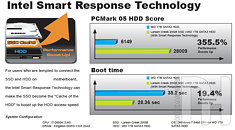- Joined
- Oct 9, 2007
- Messages
- 47,591 (7.45/day)
- Location
- Dublin, Ireland
| System Name | RBMK-1000 |
|---|---|
| Processor | AMD Ryzen 7 5700G |
| Motherboard | Gigabyte B550 AORUS Elite V2 |
| Cooling | DeepCool Gammax L240 V2 |
| Memory | 2x 16GB DDR4-3200 |
| Video Card(s) | Galax RTX 4070 Ti EX |
| Storage | Samsung 990 1TB |
| Display(s) | BenQ 1440p 60 Hz 27-inch |
| Case | Corsair Carbide 100R |
| Audio Device(s) | ASUS SupremeFX S1220A |
| Power Supply | Cooler Master MWE Gold 650W |
| Mouse | ASUS ROG Strix Impact |
| Keyboard | Gamdias Hermes E2 |
| Software | Windows 11 Pro |
Remember the very first strains of Ibex Peak LGA1156 platform motherboards such as this one? Remember that small memory slot next to the bigger DIMM slots? That was Intel's ambitious "Braidwood" technology, a NAND-flash based hard drive assist feature. Fast NAND flash memory would be installed onto the motherboard in the form of removable modules, and those modules would quicken system booting, and act as a fast cache for the system drive. Alas, Braidwood was axed for reasons unknown till date. Maybe it made Ibex Peak platform a lot faster than it should be, or maybe its design wasn't perfected or flawed. Regardles, it disappeared.
Two platforms (Ibex Peak and Cougar Point) later, a similar technology is making its way through Intel's pipes, this time it has a proper market name: Intel Smart Response Technology, and comes with another new development, Larsen Creek. Larsen Creek is the codename of Intel's upcoming line of solid state drives. However, it is targeting entry-level, low-capacity markets, and what better way to sell it than club it with Intel's new platform technology, Smart Response. Instead of NAND flash modules (Braidwood), Intel's Smart Response technology uses SATA SSDs to accelerate hard drives. The SSD can be of any size and speed, it's just that Larsen Creek is the most appropriate given that it will come in capacities as low as 20 GB, and be quite inexpensive.

Smart Response provides a middle ground between capacious but slow and inexpensive hard drive storage, and fast but small and expensive SSD. With it, one can retain a high-capacity hard drive, and speed it up using a small SSD. The technology uses the small SSD's low access times and high speeds to make it work as a cache of the HDD, it might even store copies of key parts of the HDD such as the boot volume and system files, to make booting faster, and the system more responsive overall. The technology that goes into this, however, isn't ground-breakingly new. It builds upon some principles of Windows ReadyBoost that lets you use flash-based storage devices as system caches, and similar HDD/SSD hybrid storage solutions such as SilverStone HDD Boost.
Intel put its new technology to test with PCMark 05 where the test system saw over 350% jump in HDD score. A more real-world test such as Windows startup time, saw close to 20% reduction. Intel's Smart Response Technology will be provided with the upcoming Z68 chipset and future Panther Point chipsets.
View at TechPowerUp Main Site
Two platforms (Ibex Peak and Cougar Point) later, a similar technology is making its way through Intel's pipes, this time it has a proper market name: Intel Smart Response Technology, and comes with another new development, Larsen Creek. Larsen Creek is the codename of Intel's upcoming line of solid state drives. However, it is targeting entry-level, low-capacity markets, and what better way to sell it than club it with Intel's new platform technology, Smart Response. Instead of NAND flash modules (Braidwood), Intel's Smart Response technology uses SATA SSDs to accelerate hard drives. The SSD can be of any size and speed, it's just that Larsen Creek is the most appropriate given that it will come in capacities as low as 20 GB, and be quite inexpensive.

Smart Response provides a middle ground between capacious but slow and inexpensive hard drive storage, and fast but small and expensive SSD. With it, one can retain a high-capacity hard drive, and speed it up using a small SSD. The technology uses the small SSD's low access times and high speeds to make it work as a cache of the HDD, it might even store copies of key parts of the HDD such as the boot volume and system files, to make booting faster, and the system more responsive overall. The technology that goes into this, however, isn't ground-breakingly new. It builds upon some principles of Windows ReadyBoost that lets you use flash-based storage devices as system caches, and similar HDD/SSD hybrid storage solutions such as SilverStone HDD Boost.
Intel put its new technology to test with PCMark 05 where the test system saw over 350% jump in HDD score. A more real-world test such as Windows startup time, saw close to 20% reduction. Intel's Smart Response Technology will be provided with the upcoming Z68 chipset and future Panther Point chipsets.
View at TechPowerUp Main Site
Last edited:




